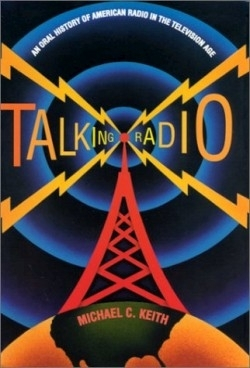Talking Radio
An Oral History of American Radio in the Television Age
While the birth of television didn’t bring about the death of radio as predicted by many, including the then president of NBC, it did cause it to fall on troubled and uncertain times. The stars of radio, Jack Benny, Bob Hope, Groucho Marx, Burns and Allen et al, followed “Mr.Television” Milton Berle on to the television screen and radio was no longer the household’s number one entertainment medium.
Michael C. Keith, a former broadcaster, senior lecturer of communications at Boston College and the author of over a dozen books on radio, lets us “listen in” on more than one hundred broadcasting executives and personalities as they trace radio’s history from its sharp decline in the early fifties to the influential and profitable position it enjoys today.
Keith has done a good job in assembling people with varying backgrounds, different points of view and from all sections of the country. From Studs Terkel recalling the “brilliance and creativity” of radio’s early years to True Boardman remembering an “overemphasis on evil doings and foul deeds.” From Paul Harvey calling the Howard Stern style of broadcasting “inexcusable” to Dick Orkin finding Stern “unique” and a “reminder of radio’s strength as an up-close and intimate medium.” As to its future, Walter Cronkite is one of several who suggests that it might become an adjunct to the Internet while Larry Gelbart laments that “despite all these new technologies, it will be just an outbox filled mostly with prattle (except for Garrison Keilor) and the same old same old.”
The book’s wide range of discussions and debates leaves it up to the reader to conclude the impact of radio’s contributions in the past, what it’s contributing today and what might be expected of it in the future. It merits a place on the bookshelves of anyone who is or has been a part of the broadcast industry, and should also be of almost equal interest to the members of its audience. (December, 1999)
Reviewed by
Frank Sisson
Disclosure: This article is not an endorsement, but a review. The publisher of this book provided free copies of the book to have their book reviewed by a professional reviewer. No fee was paid by the publisher for this review. Foreword Reviews only recommends books that we love. Foreword Magazine, Inc. is disclosing this in accordance with the Federal Trade Commission’s 16 CFR, Part 255.

